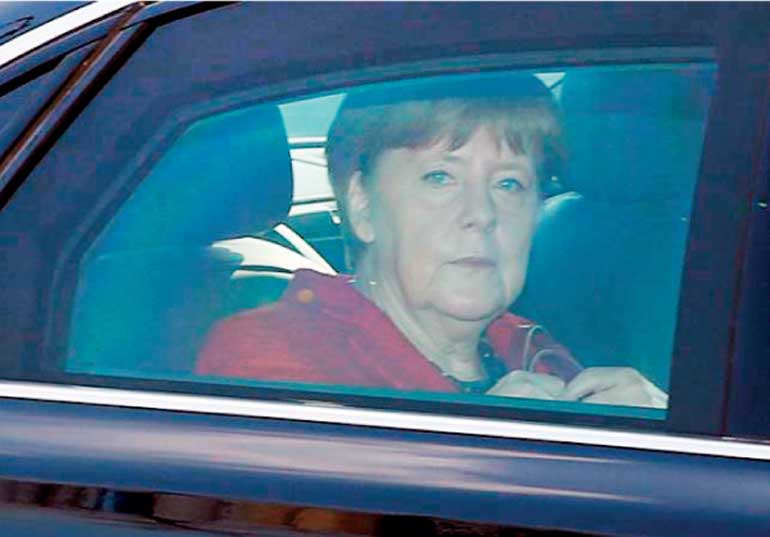Sunday Feb 22, 2026
Sunday Feb 22, 2026
Tuesday, 15 March 2016 00:02 - - {{hitsCtrl.values.hits}}
BERLIN (Reuters): Critics of Chancellor Angela Merkel’s open-door refugee policies called on her to change course after voters in three regional elections punished her conservatives and flocked to a new anti-immigration party that wants German borders closed.
Merkel’s Christian Democrats (CDU) lost support in all three states – the industrial state of Baden-Wuerttemberg, the wine-growing region of Rhineland-Palatinate and the eastern state of Saxony-Anhalt – in the first elections that gave voters a chance to react to Merkel’s migrant policy.
The right-wing Alternative for Germany (AfD), which takes a hard line on immigration, took around a quarter of the vote in Saxony-Anhalt, becoming the second biggest party there, and also made strong gains in the other two states.
“The wake-up call” ran the headline on the front page of Monday’s Handelsblatt newspaper above a cartoon picture of Merkel in a track suit struggling to hold up weights representing her conservatives and the Social Democrats (SPD), her junior coalition partner at the federal level.
 German Chancellor and leader of the Christian Democratic Union (CDU) Angela Merkel sits in her limousine as she arrives to a party’s meeting in Berlin, Germany, 14 March
German Chancellor and leader of the Christian Democratic Union (CDU) Angela Merkel sits in her limousine as she arrives to a party’s meeting in Berlin, Germany, 14 March
“Simply continuing on the same path is not an option,” the business daily said in an editorial, referring to the refugee crisis, integration concerns and a lack of convincing answers from the CDU and SPD to other issues such as digitalisation.
Germany took in 1.1 million migrants fleeing the Middle East, Africa and elsewhere last year and is expecting hundreds of thousands more to arrive this year. That has stoked concerns among some Germans that their country is being overrun by migrants with cultures that are vastly different to their own.
Andreas Scheuer, general secretary of Bavaria’s Christian Social Union (CSU), sister party to Merkel’s CDU, said Germany needed to come up with quick and effective solutions to limit the influx of migrants.
“This result has shown a lot of protest voters have expressed discontent on the biggest issue – the refugee topic – so all of the established parties that stood for election in the three states need to draw the conclusion ‘we have understood’” he said on German radio Deutschlandfunk.
Mario Ohoven, president of the BVMW Mittelstand association, said the AfD’s success should trigger government policy changes, adding that if Merkel stuck to her current refugee stance, the right-wing populist movement would keep growing.
Erika Steinbach, a CDU member of parliament who has been critical of Merkel’s stance, suggested on Twitter that the government was acting like a “dictatorship” with its refugee policy.
But others saw little reason for Merkel, who has led Europe’s biggest economy for a decade, to change tack.
In an editorial mass-selling daily Bild said Merkel had experienced a “crushing defeat on this super torturous election Sunday” but would likely stick to her political course and said the price for this would be a deeply divided conservative group.
“That’s where the real danger for Merkel lies. No chancellor in Germany has ever been able to rule against his or her own party for long,” it said.